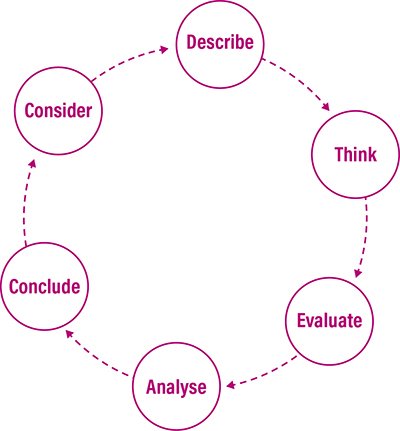How to use your COVID-19 experience for reflective practice

Amid the upheaval of the pandemic, nurses can use reflection to process their experiences and improve practice
- The COVID-19 response has seen nurses adapt to different ways of caring in different environments, and reflection can help process these often stressful experiences
- The usual mechanisms for reflection have been disrupted by the pandemic, but reflective practice is an ongoing process that individuals and teams should not overlook during this time
- Nurse managers can support teams by building reflection into the daily routine, using initiatives such as Team Time to support this

As the COVID-19 pandemic – and the pressures facing the NHS – continue, many nurses may feel they have less time than ever to reflect on their work.
But with many working in different roles, in different ways, and in stressful and challenging circumstances, reflective practice is more key than ever, expert nurses suggest.
The usual ways that nurses reflect with colleagues have been disrupted
Nurses may usually access reflective practice through chats with colleagues on tea breaks, in team meetings or meetings with managers, or through clinical supervision and large group meetings such as Schwartz rounds. But in the current circumstances, many of these approaches may be inaccessible.
According to the Nursing and Midwifery Council (NMC), reflection is how health and care professionals can assess professional experiences, both positive and when improvements may be needed, and find insight to aid their learning and identify opportunities to improve.
‘Reflective practice is not something that is switched on and off. Being a reflective practitioner is something that you are, and it is especially useful in times of stress, extreme situations and uncertainty’
Philip Esterhuizen, nursing lecturer, University of Leeds
Reflection allows an individual to continually improve the quality of care they provide and gives multidisciplinary teams the opportunity to reflect and discuss openly and honestly, a joint statement from nine health regulatory bodies, including the NMC, said in 2019.
Reflective practice can help build resilience during stressful experiences
This approach is also intended to benefit and protect staff. The Point of Care Foundation suggests that reflective experiences help to build resilience, improve well-being and deepen professional commitment.
But how should this approach be continued by staff in the NHS and social care during the pandemic?
Throughout COVID-19, nurses have found themselves facing extreme pressures and unfamiliar situations. They have faced worries about personal protective equipment, redeployment, risk to themselves, their families and patients from the virus, and of course, the impact of losing colleagues and loved ones.
In a recent Nursing Standard survey, eight out of ten of the 1,650 nurses who responded said their mental health has been affected by the pandemic, with some reporting symptoms of post-traumatic stress disorder.
University of Leeds nursing lecturer Philip Esterhuizen says that clinical colleagues have told him about the extreme and often traumatic experiences they are dealing with every day.

in times of extreme stress and uncertainty’
‘Nurses are experiencing things they have never experienced before and that will bring all kinds of emotions. So it is important to structure that in a constructive way, rather than fretting,’ he says.
Reflection should be an ongoing process, not just a tick-box part of revalidation
He says reflective practice is an approach that nurses should be using at all times, not just reaching for it to complete the paperwork every three years when revalidation looms.
‘Reflective practice is not something that is switched on and off,’ he says. ‘Being a reflective practitioner is something that you are, and it is especially useful in times of stress, extreme situations and uncertainty.
‘When things are so pressured it is valuable to be able to reflect on what we have done, how we have done it and whether we met the standards or criteria we wanted to meet. Or where we could have improved things, or just to think “I did that really well today”.’
- RELATED: Understanding reflective practice
Reflection does not have to be an elaborate or formal procedure
The NMC’s decision to make reflective practice a key part of the revalidation process that all nurses have to undergo to maintain their registration shows the importance placed on it by professional leaders.

contemplate your day on the way home
Picture: iStock
But it doesn’t need to be a formal, written exercise. Reflection can be a solitary activity and should be done frequently to help protect nurses from burning out emotionally, Dr Esterhuizen says.
‘Even before the pandemic there was a huge amount of pressure on staff and resources, so to look after and protect yourself emotionally, it is important to reflect on how you are feeling and coping. It is quite easy to become alienated from yourself when there is so much risk to yourself, your patients and your family. That causes risks for everyone concerned.’
Dr Esterhuizen is keen to stress that it needn’t be time-consuming.
‘It is very easy,’ he says. ‘It can just mean taking a few minutes when you are reliving part of your shift on the way home, walking to your car or catching the bus, and you can use a simple approach, such as the Gibbs model, to provide structure.’
- RELATED: Reflective practice
The Gibbs model: a reflective cycle
Gibbs’ reflective cycle is one of the best known and simplest ways to structure reflective practice.
Nurses can use this as a guide when reflecting both informally and formally.
It can help nurses consider what they did well, even during difficult experiences, and help them consider what they would wish to do differently in the future.
It covers six stages:
- Describe the experience
- Think about the feelings and thoughts prompted by the experience
- Evaluate the experience, both good and bad
- Analyse to make sense of the situation
- Conclude – what you learned and what you could have done differently
- Consider an action plan for how you would deal with similar situations in the future, or general changes you might find appropriate
Source: University of Edinburgh: Guide to the Gibbs reflective cycle
The Gibbs model suggests six simple steps to work through, starting with describing to yourself the situation, followed by thinking about the emotions and feelings the situation prompted, and then what went well and not so well.
Then briefly analyse to make sense of the experience, before considering what you learned and what could have been different. Finally consider an ‘action plan’ of how you would do it differently in the future.
Reflection can be built into the working day for nursing teams

accounts can be used in the present’
‘Using a a model to structure your thoughts is really helpful. As there is so much going on and because it is so traumatic for everyone, the risk is that your thoughts get into an ever decreasing cycle of negativity,’ Dr Esterhuizen says. ‘By using a structure you can get a foothold to work constructively through your experience without losing your way and beating yourself up.’
Reflective practice is a chance to work through experiences in a constructive manner, agrees Alison Finch, assistant chief nurse at University College London Hospitals NHS Foundation Trust and a National Institute for Health Research clinical doctoral research fellow.
The value of reflection is recognised at her trust in a number of ways, including facilitated debriefs at the end of a shift and group supervision with hospital psychologists. The careers service has also been supporting staff to reflect on their practice in a way that helps identify, or nudge them to connect with, their personal strengths.
Such reflection needs to be built in to nurses’ daily lives as the workforce prepares for long-term change, Ms Finch says.
‘This is all about building resilience,’ she says. ‘We don’t know how long this will go on. It is not going to be a finite period of time and then everything goes back as it was.
‘In the future, many clinical services will work in a different way now we have proved that they can work. Things like patients doing more self-surveillance and nurses seeing more patients remotely are likely to stay.
‘But to capture the learning and the positives, while recognising the challenges of these changes, staff need time to reflect in real time, rather than waiting until next year when this is all done.’
How nurse managers can support staff to reflect
Nursing managers can play a key role in helping nurses build reflection into their daily work.
Alison Finch suggests supporting this by:
- Checking in with staff at the start of shifts, inviting them to share how they are feeling
- Sharing reflective insights in conversation with others to model such practice
- Working with coaching techniques when speaking to colleagues. Rather than offering advice, ask ‘What are you noticing here?’, ‘What amid all this is there to feel proud of?’, ‘How can you build on this?’
- Protecting time for a 5-10 minute debrief at the end of a shift and ensure it happens to reinforce its importance
Recording responses in the moment for your reflective accounts
Ms Finch recommends keeping a diary, making voice memos or taking notes to help organise thoughts for reflection.
These entries can also be useful for revalidation, which requires five self-reflective accounts from the nurse’s previous three years of work.

For this element, nurses must use the NMC form, which is divided into four sections – describe the event or experience, say what was learned from it, how practice was changed and improved as a result, and how it is relevant to the Code.
‘Why wait?’ says Ms Finch. ‘The reflective accounts form can be used in the present, and help nurses to think what they are learning right now to guide their practice in a way that helps us to work responsively.’
‘This is a time that will be a poignant period in nurses’ careers. Many people have drawn on capabilities and strengths they didn’t know they had or have not used for a while’
Alison Finch, assistant chief nurse at University College London Hospitals NHS Foundation Trust
Ms Finch says the pandemic could also have a fundamental impact on people’s future career choices. For many nurses, including senior and research nurses and clinical nurse specialists, COVID-19 has brought a return to bedside nursing, and this has often been a positive experience.
Opportunities to consider what this means for their future could be lost if they don’t get a chance to think it through, she says.
View our COVID-19 resources centre
‘This is a time that will be a poignant period in nurses’ careers,’ she says. ‘Many people have drawn on capabilities and strengths they didn’t know they had or have not used for a while. Many nurses are finding it really fulfilling, also career defining and they are flourishing.
‘It goes back to the very core of why you became a nurse in the first place. Nurses need a chance to reflect on that, and this could positively inform their careers.’
Team Time: enabling reflective practice during unusual times
A new programme to support reflective practice in a team has been developed in response to the COVID-19 pandemic.
Team Time has been designed, piloted and implemented rapidly as a way for teams to come together and discuss the emotional burden and impact of the care they are providing.
Developed by the Point of Care Foundation, it draws on many aspects of the well-established Schwartz rounds.
Schwartz rounds are a forum for all staff members in a care setting to come together to discuss the challenges of their work, and usually take at least an hour.
Team Time is designed to be shorter, involve smaller groups of people and can be done remotely, but still involves a trained facilitator and someone sharing a story or experience to prompt discussion.
The foundation says the idea is to provide a non-hierarchical space for staff to process and share what it is really like to do the jobs they do. The premise is that all staff, other than those whose turn it is to provide skeleton cover, should attend the sessions.
Sessions forge a space for nursing staff to share their experiences
Schwartz round trainer and mentor Rhiannon Barker has helped train 300 Schwartz round facilitators in the new approach over recent weeks.
Nurses have expressed their appetite for the programme through the online training, she says.
‘It is interesting to see how valuable people find any sort of reflective practice,’ she says. ‘People have been incredibly receptive to the programme. Hearing people’s stories and narratives, it is clear that life has changed for us all. People deal with things in different ways, but it is a healthy reaction to share some of the pressures. ’
She says the kind of stories and experiences that participants share would ‘normally happen while the kettle is boiling, but people don’t have the chance to do that now.’
‘We try to help tell everyday stories, but everyday stories have become so unusual – and some are pretty harrowing,’ she says.
Erin Dean is a health journalist
Further information
- NMC statement on reflective practice
- NMC: How to revalidate during COVID-19
- The Point of Care Foundation: Schwartz Rounds
- Point of Care Foundation: Team Time
- University of Edinburgh guide to Gibbs reflective cycle
Register for free updates 
We have made it easy for you to stay up to date with the latest developments in nursing, including relevant COVID-19 information.
Register with us for free – it takes less than a minute – and you'll receive news and updates straight to your inbox.

